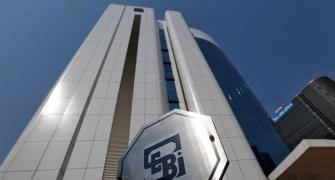Hopes of revival and earnings growth in 2020, surprise tax cuts, and robust foreign flows - thanks to easy global monetary policies - are a few reasons why the markets have managed to digest the low GDP footprint.

The markets have managed to continue their winning run despite faltering economic growth. For the three-month period ended September, the country’s gross domestic product (GDP) grew at 4.5 per cent, its slowest pace since March 2013.
The market, however, has largely been unperturbed by the GDP shocker.
Economic conditions are key to market performance as strong GDP growth results in strong corporate earnings - a key driver for share prices.
Then what explains the optimism in the market?
Hopes of revival and earnings growth in 2020, surprise tax cuts, and robust foreign flows - thanks to easy global monetary policies - are a few reasons why the markets have managed to digest the low GDP footprint.
While the GDP data is released with a two-month lag, markets always try to factor in future expectations.
Most economists and analysts are projecting economic and corporate earnings growth to pick up by next year.
“We expect 2020 to be better than 2019 and FY21 to be better than FY20 on account of five reasons,” says Prachi Mishra, India chief economist, Goldman Sachs.
“First, the global economy could improve moderately; second, domestic financial conditions have improved sustainably following rate cuts; third, fiscal impulse is expected to be positive; fourth, the easing of supply bottlenecks following series of reforms; and finally, the early signs of economic stabilisation.”
The US-based investment bank forecasts GDP growth of 6.6 per cent in FY21, and expects corporate earnings to grow 16 per cent in CY20, slightly below consensus estimates of 20 per cent.
Deteriorating economic conditions domestically this year have led to easing of monetary policy by most central banks.
The US Federal Reserve lowered policy rates by 75 basis points (bps) and moved from balance sheet reduction to mild expansion.
Similarly, the European Central Bank resumed its quantitative easing drive.
Most central banks, including the Reserve Bank of India, have cut interest rates.
This has boosted liquidity and risk sentiment amid softening of bond yields.
Over $6 billion have flown into India since September, driving up share prices.
Further, economists predict the easy monetary stance will continue till growth revives, which could be well into next year.
“If global growth stabilises and recovers over the course of 2020, as we expect, the monetary easing seen over the course of 2019 is likely to come to an end, with most major central banks on hold over 2020,” says Ric Deverell, chief economist at Macquarie.
It is not that there has been no impact of the slowing economic growth on the market.
In September, both the Sensex and Nifty declined to seven-month lows in flows, on concerns surrounding the slowing growth and financial sector turmoil.
After Finance Minister Nirmala Sitharaman surprised the Street with reduction in the corporation tax rate to 22 per cent (excluding surcharges) from 30 per cent, indices soared close to 8 per cent in the following two sessions.
Arguably, if not for the tax cuts, they could have been 5-10 per cent lower than the current levels.
The tax cut led to all-round buying in the market, amid realigning of stock prices with fresh earnings projections.
Hopes of further reform measures have kept sentiment buoyant.
It seems that the pain in the broader markets has been masked by the indices touching new highs.
So far this year, the Nifty has hovered around record highs, but the Nifty Midcap 100 and Nifty Smallcap 100 have declined 41 per cent and 25 per cent from their peaks.
Several stocks are much below their record levels.
Even in the benchmark indices, nearly half the stocks are back to their 2018 levels.
Select bluechips such as Reliance Industries, Bajaj Finance, Asian Paints, and ICICI Bank have gained sharply this year.
On the other hand, YES Bank, Zee Entertainment, and Indiabulls Housing have seen a sharp fall.
Similarly, automobile stocks have corrected sharply amid the drop in sales.
Market players say the divergence in market performance is on account of weak economic conditions.
In an environment of healthy growth, mid-caps and small-caps tend to perform better than large-caps.
Most of the recent gains in stocks have been on account of valuation re-rating, amid weak earnings growth.
This has resulted in valuations of several stocks soaring to record highs.
Analysts say investors have already priced in the earnings growth for next year, which could mean muted returns in 2020.
Goldman Sachs, for instance, expects the Nifty to gain only 8 per cent next year.
“The performance in 2019 has been pretty good against the backdrop of soft profit growth.
"So, we’ve borrowed from the potential performance in 2020,” said Timothy Moe, chief Asia-Pacific regional equity strategist at Goldman Sachs.
High valuations also mean little room for disappointment.
If earnings or GDP growth fails to pick up as estimated, markets could be vulnerable to sharp corrections, say analysts.










